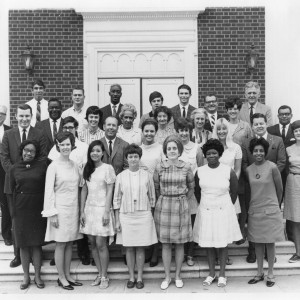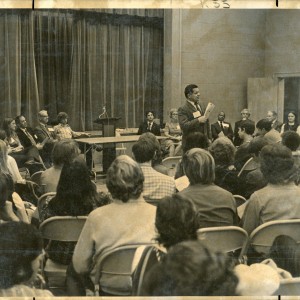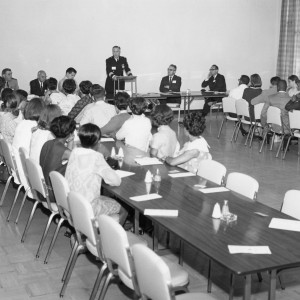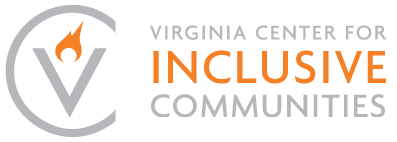History
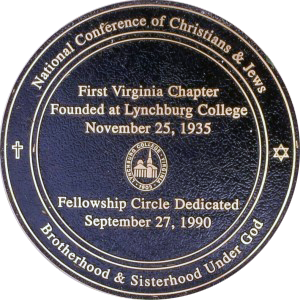
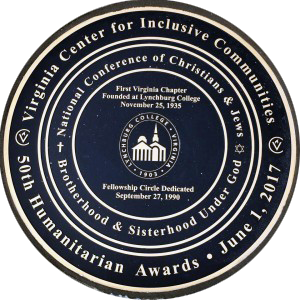
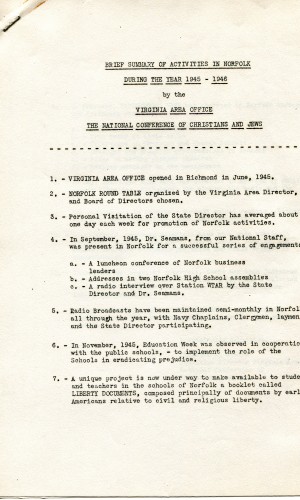
Our Founding
The work of the Virginia Center for Inclusive Communities had its beginning in Lynchburg, Virginia in 1935. It was part of a grassroots movement that emerged in a number of communities across the United States in response to the antisemitism and anti-Catholic sentiment of the time.
That year, the President of Lynchburg College (now the University of Lynchburg) took the lead in pulling together a number of Catholic, Protestant, and Jewish leaders to develop an educational program of communication and understanding. The group called itself the Lynchburg Round Table and almost immediately organized an all day Interfaith Conference. The meeting was held on November 25, 1935, in the gymnasium at Lynchburg College and attracted nearly a thousand people including many clergy and lay leaders from other Virginia communities. According to news accounts of the time, the conference featured an informal discussion among a rabbi, a priest, and a Protestant minister followed by an endorsement of their efforts from one of Virginia’s Senators.
Expanding Reach and Work
The visitors present took the idea of the Protestant-Catholic-Jewish Round Table back to their communities. Chapters of the movement were subsequently founded in Richmond and Norfolk, and by 1946, those chapters were affiliated with the National Conference of Christians and Jews, cooperating as part of the Virginia Region of the NCCJ. New chapters were soon developed in Martinsville, Harrisonburg, Roanoke, the Peninsula, Petersburg, and Suffolk. In addition, the Lynchburg Round Table affiliated with the NCCJ Virginia Region in 1948.
Programs promoting interfaith understanding grew in many of the chapter locations. The Humanitarian Awards Dinners were initiated in Richmond in 1963 as a way to recognize and honor significant community work, while supporting the operations of the organization. That effort was soon spread to other areas of the Commonwealth.
Over the years, the organization became known for one-day youth seminars, summer teacher workshops and institutes, police-community dialogues and training, elementary school programs, Holocaust education, intergroup education consultations to schools and PTA’s, clergy dialogues, and many other special programs to assist Virginia communities in responding to the racial, religious and ethnic changes of the 1960s, 1970s, and 1980s.
In 1993, the organization introduced a new summer high school leadership program to its program offerings. This intensive human relations program became a unique design in reaching the youth of our community and addressed a growing need in Virginia’s schools. Similar models were developed for single high schools and colleges/universities.
New Names and Structure
Also in the early 1990’s, the organization decided to be known as “The National Conference,” maintaining the letters NCCJ. Later, in 1998, the organization re-launched as “The National Conference for Community and Justice.” These changes were intended to honor the history of the National Conference of Christians and Jews, while reflecting the fact that the work done by the organization had long since expanded to encompass additional religious groups, as well other important human relations issues of the day.
In 2005, an important decentralization took place that brought NCCJ into the 21st century. Local offices across the United States, including the Virginia Region, became independent not-for-profit corporations. During this period of transition, the local organization became known as the Virginia Conference for Community and Justice.
Two years later, in 2007, the organization relaunched as the Virginia Center for Inclusive Communities, completing the transition away from NCCJ and positioning itself for a strong and successful future. Under local Virginia leadership and control, the Virginia Center for Inclusive Communities (VCIC) was able to better serve the people of the Commonwealth of Virginia.
Today
